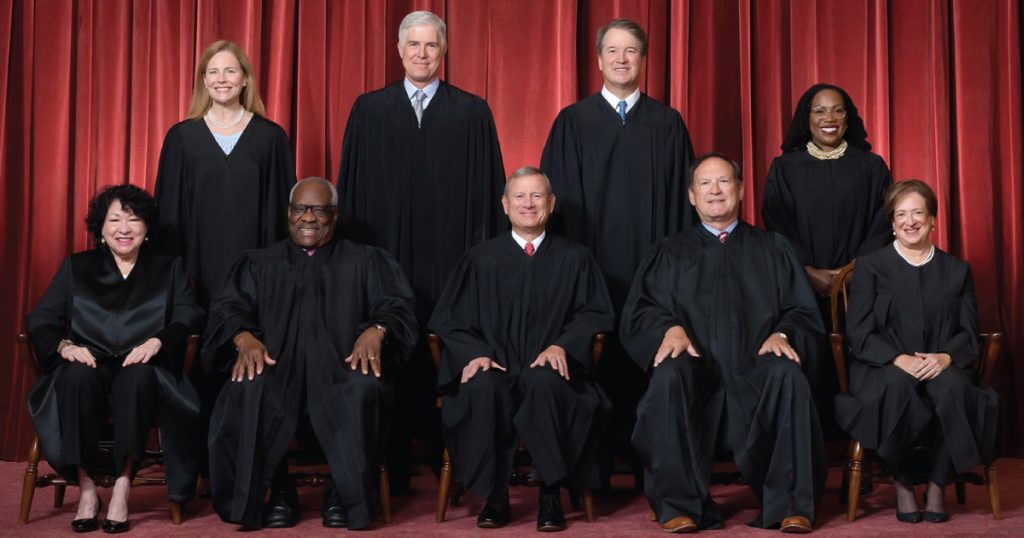WASHINGTON, D.C.—On Friday, June 28, the United States Supreme Court overturned the decades-old Chevron v. Natural Resources Defense Council, a 1984 ruling which set the precedent of when courts should defer to federal agencies’ interpretations of statues—also known as the Chevron deference.
“Judges are not experts in the field and are not part of either political branch of government,” wrote Justice John Paul Stevens in his 1984 opinion.

The decision came from a 6-3 vote with Justice Elena Kagan dissenting in an opinion joined by Justices Sonia Sotomayer and Ketanji Brown Jackson.
Chief Justice John Roberts represented the majority ruling that the Chevron deference was inconsistent with the Administrative Procedures Act (APA) and granted unelected government officials too much power.
“[A]ll today’s decision means is that, going forward, federal courts will do exactly as this Court has since 2016, exactly as it did before the mid-1980s, and exactly as it had done since the founding: resolve cases and controversies without any systemic bias in the government’s favor,” wrote Justice Niel Gorsuch in a concurring, 33-page, opinion.
The overruling took place during Loper Bright Enterprises v. Raimondo where it stated: “The Administrative Procedure Act requires courts to exercise their independent judgment in deciding whether an agency has acted within its statutory authority, and courts may not defer to an agency interpretation of the law simply because a statute is ambiguous; Chevron is overruled.”
Loper Bright Enterprises v. Raimondo was brought forth by herring fishermen from New Jersey and Rhode Island contesting fee requirements. These fishermen were represented at no cost by conservative legal groups, the Cause of Action Institute and the New Civil Liberties Alliance.
“By ending Chevron deference, the Court has taken a major step to preserve the separation of powers and shut down unlawful agency overreach. Going forward, judges will be charged with interpreting the law faithfully, impartially, and independently, without deference to the government. This is a win for individual liberty and the Constitution,” said Roman Martinez, who argued the case on behalf of one of the fishing companies.
Striking down the Chevron v. Natural Resources Defense Council decision, which has become colloquially known as the ‘Chevron Deference’ or more simply ‘Chevron,’ was the result of a concerted conservative-backed campaign led by Republican Attorney Generals, conservative legal activists, and their funders who, according to the New York Times, many of which have ties to corporations and former President Donald Trump.
The Chevron deference has played a vital role in thousands of legal decisions over the last 40 years when challenges have been brought forth against federal regulations, most notably against the 1938 Fair Labor Standards Act, the 1970 Clean Air Act, and the 2010 Affordable Care Act.
Now, the conservative Republican Study Committee (RSC) said House committees “have an opportunity to review any regulatory action that was justified by Chevron deference toward agency interpretation.”
The Supreme Court’s decision could lead to the elimination or weakening of thousands of rules on the environment, health care, worker protection, food and drug safety, telecommunications, the financial sector and more, the National Law Review predicts writing:
“The full impact of Loper will take time to sort out. Expect an initial surge in litigation challenging agency rulemaking, with lower courts grappling with how to exercise their ‘independent judgment.’ Without Chevron to even out the differences in methodologies and judicial philosophies, circuit splits will likely emerge. As such, we expect the Fifth Circuit to be the premier destination for litigants looking to challenge federal rule making.”
What’s more, federal regulators, such as the EPA, could face tougher judicial challenges when regulating environmental protections.
The Biden Administration’s ambitious plan to cut all of greenhouse emissions in half by the end of the decade, for example, could likely see more pushback than ever before. The same conservative-ruled Supreme Court which struck down Chevron were the same who thwarted the Biden administration’s initiatives regarding COVID-19 vaccines and student loan forgiveness.
“The Supreme Court today says individual judges around the country should decide the best reading of a statute. That is a recipe for chaos, as hundreds of federal judges — who lack the expertise of agency personnel — are certain to reach inconsistent results on the meaning of federal laws as applied to complex, technical issues,” said Kym Myer, Litigation Director for the Southern Environmental Law Center.
Overturning Chevron could also impact agriculture and farming bills, said Drovers, a news and marketing publication focused on the beef industry, making federal regulations such as the Clean Water Act more difficult to enforce affecting the protection of wetlands and managing agricultural runoff.
The Packers and Stockyards Act which aims to protect fair treatment of animals could also be impacted.
Steve Forbes, Chairman and Editor-in-Chief at Forbes Media, praised the supreme court’s decision Tuesday defending Article III of the Constitution which states the courts should settle controversies that arise from federal law. The, now struck down Chevron deference, formerly took the stance that federal scientists and researchers were better equipped to formulate decisions, specifically about the environment, then judges were.
“This segment of What’s Ahead lays out a raft of deleterious consequences that undermined constitutional separation of powers, including the legislative responsibilities of Congress. No longer can government agencies act like unaccountable monarchies,” wrote Forbes Tuesday.
There have been a total of 70 Supreme Court decisions relying on Chevron since the 1980’s decision, according to the Wall Street Journal, with nearly 17,000 within the lower courts.
With the Supreme Court’s decision Friday, all of these courts could be open for review. Moving forward the decision could make it easier for anyone to challenge federal regulations and win.
Author: Kienan Briscoe










